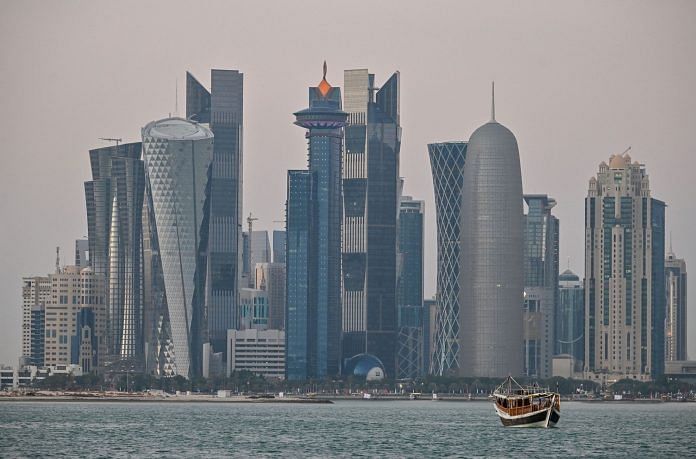Riyadh: Saudi Arabia will open its land, air and sea borders with Qatar on Monday, substantially easing a years-long diplomatic rift on the eve of a summit of regional leaders.
The step comes amid efforts to resolve the dispute that’s split Qatar from its neighbors since 2017 and complicated U.S. strategy toward Iran under President Donald Trump. The new push to mend ties comes as Trump prepares to leave office with his successor, Joe Biden, vowing to renew diplomacy with Tehran.
Tensions in the Gulf mounted on Monday as Iran seized a South Korea-flagged tanker hours before announcing it would ramp up its nuclear enrichment activities.
Officials hammered out the accord before the annual Gulf Cooperation Council summit in Saudi Arabia on Tuesday, and Kuwaiti Foreign Minister Sheikh Ahmad Nasser Al-Sabah, whose country has been mediating the Gulf row, announced the details on regional television channels. The United Arab Emirates, Bahrain and Egypt joined the Saudis in boycotting Doha.
The deal nearly fell apart on Sunday, but the White House and other parties stayed on the phone overnight to reach an agreement, according to a person familiar with the matter. Jared Kushner, Trump’s son-in-law and senior adviser, is traveling to Saudi Arabia for the accord signing on Tuesday, the person said.
The person said that the deal to open the borders was reached in exchange for Qatar dropping lawsuits it had filed in relation to the Gulf split. It wasn’t immediately clear which legal cases were involved.
Qatar’s ruler, Emir Sheikh Tamim bin Hamad, is also now expected at the summit meeting in the northwestern town of Al Ula, Al Jazeera said citing Qatar’s royal court.
“For Saudi Arabia, this is an effort to take a leadership role, to try and gain some diplomatic advantage with the incoming Biden administration,” said Karen Young, a resident scholar at the American Enterprise Institute, “and a realization perhaps that the last four years allowed too much foreign policy adventurism and experimentation.”
Saudi Crown Prince Mohammed bin Salman, the kingdom’s de facto ruler, said the summit Tuesday would bring Gulf states together, creating “reunification and solidarity to face the challenges that our region witnesses,” according to a statement published by Saudi Arabia’s state news agency.
UAE Minister of State for Foreign Affairs Anwar Gargash echoed the prince, saying on Twitter that Tuesday’s summit would “bring back Gulf cohesion,” prioritizing the region’s security, stability and prosperity.
“There’s more work ahead of us and we’re on the right track,” he added.
One of the biggest beneficiaries of the agreement is likely to be Qatar Airways. While it was unable to cross Saudi airspace, the Doha-based carrier had to abandon adding new routes and make lengthy diversions — an average of 25 minutes per flight – in order to continue to others, enlarging its fuel bill.
Still, it was unclear how far the agreement would go in easing frictions in the region after three years of heated rhetoric. Commentators cautioned that major differences would likely persist with most of the flashpoints dividing the sides — including the critical reporting of Qatar’s Al Jazeera television — unaddressed.
“The ideological gaps have not been closed either, so the GCC will remain fractured such below the surface even as they paper over differences to score points with the new White House,” said Ryan Bohl, a Middle East analyst at Stratfor.
Other disputes have riven the six nations of the GCC — comprised of Bahrain, Qatar, Oman, Saudi Arabia, Kuwait and the UAE — but none has lasted as long or cut as deep as the current one.
The boycotting nations severed trade and diplomatic ties with Qatar, accusing it of meddling in their internal affairs, supporting hardline Islamist groups and building ties with Iran, a foe for most Arab Gulf states. Qatar, the world’s largest exporter of liquefied natural gas and one of the richest nations per capita, denies the charges.
Cut off from its neighbors, Qatar has increasingly turned to Tehran and Ankara for support and relied on Iran’s airspace for overflights. That troubled the Trump administration — which had initially backed the boycott — as it sought to expand its offensive to weaken Tehran.
Bohl at Stratfor said Qatar had “little incentive to abandon those relationships” which could be used against boycotting nations that appear less inclined to open up to Doha, especially the UAE and Bahrain. – Bloomberg
Also read: US weighs immunity request for Saudi crown prince MBS in alleged assassination plot



